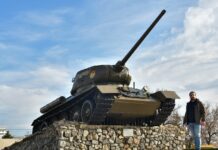THIS STORY WAS FIRST PUBLISHED IN THE IRISH EXAMINER NEWSPAPER IN 2007
Michael O’Farrell
Political Reporter in Freetown
AS our white UN jeep swings off Freetown’s Jomo Kenyatta road into the gateway of Sierra Leone’s war crimes tribunal, the guard in the sand-bagged machine gun post above the entrance trains his weapon on the driver.
Another armed guard checks for bombs under the jeep with a long mirror before ushering us in. This tension-filled place is the home of justice West African style.
Mandated by the UN and formed in partnership with the Government, Sierra Leone’s Special Court is the best chance this country has of punishing those responsible for more than 10 years of brutal bloodshed during which more than half a million people were killed or savagely mutilated.
The war crimes tribunal – a sister to those in Rwanda and the Hague – has been investigating cases against 11 indicted men accused of hideous war crimes including unlawful killings, physical and sexual violence, abductions and looting.
Nine are already in custody in specially constructed holding cells within the court’s compound but controversially former Liberian President Charles Taylor was allowed flee into exile in Nigeria last summer.
Chief prosecutor, David Crane has for two years now investigated some of the most depraved crimes imaginable.
“Just two weeks ago in Makeni a woman stood up and her face was missing. She was holding her child and they had jammed her face into a pot of boiling oil. She said; ‘All I want to do is tell you that and hope that you seek justice. It was a very moving moment,” said chief prosecutor David Crane.
When hearings begin this summer there will be many more such stories. “A lot of these victims are going to have to relive the very tragic moment by which they lost lips, eyes, buttocks, breasts, genitalia, arms legs….etc. One woman described seeing her entire family including her husband and four children chopped to pieces.
“The point is there is a lot of trauma here. People want to tell their stories. They have come forward in great numbers and they will show the world what took place here and I’m very proud of their courage to want to do this.”
Mr Crane is painfully aware that knowing what happened to thousands upon thousands of citizens here raises its own obligations and questions about the nature of humanity.
“We can’t just walk away from these types of incidents. We have to be able to say this can’t happen in the 21st century. We are better than this. Impunity has to be cut down and scoured out wherever it is found to ensure justice. This has to happen. Mankind is better than this.”
But apart from the court’s inability to capture Charles Taylor there are other criticisms including the fact that the court it is running side by side with a truth and reconciliation commission.
In addition some of those indicted are popular former civil defence and Government leaders who fought against the rebel militias during the war.
However Mr Crane, a US national with a Department of Defence background, rejects all the criticisms and believes Sierra Leone’s Special Court will become a template for future war crimes tribunals, not least in neighbouring Liberia.
“I think they got this one right – a specific mandate, a specific manageable timeframe – but also the genius of this is putting it right where it should be. It has to be right where it took place. This is about the victims and the families and the citizens of the country. They can see us arrive, they can see us build this, they can see us having trials and they can see the finish. Justice literally blossoms in front of them,” he said.
The flip side is that any failure to complete the court’s work and see justice fairly done could topple a country finely balanced on the edge of peace back into violent struggle again.
ENDS




